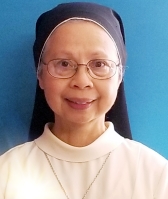Sr. Glorina Jugo

Structure: Viceprovince of United States
Member: Elected
Profession: 10/14/2006
Born in the Philippines.
Education in Pharmacy and Medical Technology.
Present Mission
Superior of Dourdan formation community, US Vice-province.
Saint Anne’s Hospital, Fall River, MA USA: Ministry in Pastoral Care (Chaplaincy), Mission and Bioethics.
What you think are the great challenges for the Congregation in the next 5 years?
In the context of living in the 21st century with its global and multiple moral and socio-economic crisis, I consider the following as great challenges for us in the next 5 years and we can strive to address actively:
- Vibrant and visible spirituality: There is an urgent need to ensure one’s spirituality is continually nurtured and protected from negative influence of faulty thinking that abounds in our consumeristic society especially in the Western hemisphere. Furthermore, it should have the hallmark of total alignment with all the advices of Blessed Marie Poussepin and the teachings of the Church especially on Christian social justice and morality that have direct impact on sacramental life and the moral foundation of daily family life. In order to be authentic witness and faithful to our unique identity and spirituality, we need to live in a manner that:
(a) promotes continual spiritual growth that leads to fulfillment of each sister’s religious life and personal mission,
(b) contributes positively to community life and its mission as expressed in joy-filled attitude,
(c) presents ourselves visibly as a prophetic presence in our atheistic secularized world.
- Vital initial and on-going formation: Living the disciplines of the Congregation’s formation process in such a manner that no critical aspect of its core values is compromised, distorted or abandoned. Rather, with creative fidelity and obedience of faith, one is able to be and remain a radical eschatological witness to Gospel values in a secular post-Christian environment dominated by relativistic and materialistic attitudes.
While the essential principles of religious formation are essentially the same for the young (below 30 years of age) and matured (over 30 years of age), the process model for formation in each case may differ on account of significant differences in life experiences and expectations between the two age groups. To this end, there is a need for formators to be sensitive to “hidden or unspoken” needs of those in initial formation and to ensure the formation process allows for creativity and periodic evaluation to confirm the needs are met. The same holds true for on-going formation of professed sisters.
Include in formation process in-depth awareness and correct understanding to local and global challenges with its potential impact (positive and negative) to our community and society. This knowledge is essential in determining appropriate education, training, and skill sets the sister must have in preparation for mission.
- Mission beyond the borders. Consider a paradigm shift in our approach to looking at and resolving major issues: think global, act local. With diminishing number of active sisters capable of going to mission, the more we need to:
(a) carefully choose projects and then strategically develop efficient and effective means to achieving goals that will ultimately become the foundation of permanent solutions of global problems of which there are many such as: safe and affordable housing, opioid crisis, mental health, abortion, human trafficking, homosexuality, ecological stewardship
(reduce environmental pollution and address global warming),
(b) express concrete support for promulgation and enforcement of government laws and regulations that will actively transform lives and restore a person’s self-respect and inherent human dignity.
.



